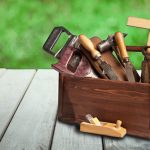
Survival essentials: 20 Items to take with you when you go off grid
Thursday, January 27, 2022 by Divina Ramirez
http://www.naturalnewstips.com/2022-01-27-20-essential-items-for-off-grid-living.html

Going off the grid means committing to living more sustainably and reducing the resources you consume. Most people who go off-grid also do so to be less dependent on utilities, which can be affected by natural disasters. When you live off-grid, you also get to be more in touch with your environment and learn valuable skills.
But going off the grid requires careful planning and preparation. Do you have the right tools for collecting water? What about food and firewood? Are you well-equipped to build your own fences and animal pens?
Familiarity with the tools you’ll need to maintain an off-grid home or homestead will help see you through your first few months of off-grid living. You’ll gradually learn what works best for your needs and the environment. In the meantime, here’s a list of essential tools you should take with you if you plan to live a more sustainable life off the grid. (h/t to Survivopedia.com)
- Chainsaw – A decent gas or electric chainsaw will allow you to easily prune trees and chop firewood.
- Table saw – A powerful table saw will allow you to tackle various Do-It-Yourself (DIY) projects. This tool is especially great for building your own furniture or structures around your homestead.
- Hand saw – Keep a hand saw in your tool shed for when your chainsaw breaks or runs out of power.
- Axe – A sturdy axe is a reliable tool for chopping wood and clearing brush.
- Shovel – A sturdy shovel will be an immense help when preparing your vegetable garden. It can also help you level the ground easily for putting in posts or laying down boards.
- Rake – A rake is an essential tool for gardening. You can also use it to heap up mulch and leaves for your compost heap.
- Hoe – Another essential gardening tool, a hoe allows you to easily dislodge weeds and prep your soil.
- Tiller – A tiller is handy for breaking up hard, compact soil into loose dirt for gardening.
- All-Terrain Vehicle (ATV) – An ATV allows you to easily haul gear and supplies even in rough terrain.
- Utility trailer – Attach a utility trailer to your ATV to haul more supplies through rough terrain.
- Cordage – Ropes allow you to secure your belongings and equipment. (Related: 6 Types of rope and why you need them for survival.)
- Tractor – A tractor can be used to pull a variety of homestead implements for plowing, planting and harvesting crops. It can also be used for hauling materials and personal transportation.
- Post hole digger – This tool allows you to dig holes in the ground for general purposes, such as erecting fences and signs. You can also use it to erect stakes for climbing plants.
- Assorted hand tools – Don’t forget to include the basics in your toolbox or shed, such as a wrench, pliers, a hammer and a screwdriver. You’ll need these tools to tackle DIY projects and for the general maintenance of your off-grid home or homestead.
- Level – A level is useful for making sure your measurements are accurate when making furniture or building structures around your homestead.
- Knives and sharpeners – A good set of knives is useful for hunting game, cleaning fish and doing work in your garden. Make sure to keep your knives sharp with a whetstone.
- Tape measure – A tape measure isn’t just for tailoring clothes. It’s also handy for tackling DIY projects, making furniture and erecting fences.
- Water pump and filter – If you live in an off-grid home, you can get water by collecting rainwater in a cistern or hauling fresh water from a nearby lake or river. Whichever option you choose, a water pump and filtration system are essential to making sure your water is clean and safe to drink.
- Sledgehammer – A sledgehammer is ideal for striking wood, metal or stone. It’s great for tearing down or changing structures in your homestead.
- Wheelbarrow – A utility tractor and ATV are great for hauling materials over long distances. A dolly or wheelbarrow, on the other hand, is better for small jobs around your home, such as hauling compost, distributing waste and clearing out job sites.
From growing food to repairing fences, there is always something to be done in an off-grid home or homestead. As such, it’s important that you have the right tools to tackle the daily tasks that come with an off-grid lifestyle.
Offgrid.news has more articles with tips on how to prepare for off-the-grid living.
Sources include:
Tagged Under: Tags: Gear, home gardening, homesteading, off grid, preparedness, prepper, prepping, survival, survival gear, sustainable living, tips
RECENT ARTICLES


Survival essentials: 20 Items to take with you when you go off grid

7 Historical superfoods that people can stockpile for years without refrigeration

Bug out survival planning: 4 Things to consider when building an emergency shelter
By Zoey Sky

Want to protect your assets against inflation? Consider owning precious metals like gold and silver
COPYRIGHT © 2017 NATURAL NEWS TIPS


